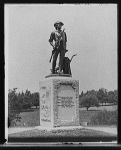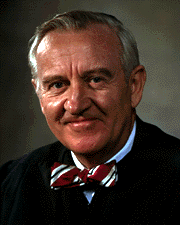Posted on May
15, 2014
Bent Amendment
Justice Stevens can’t shoot straight
by
Daniel
Clark
Judging from the way that former Supreme Court
Justice John Paul Stevens writes about the Second Amendment, he must think the American
people have a right to gopher brains, instead of a right to bear arms.
Last month, Stevens penned an op-ed to promote his
new book, Six Amendments, in which he
explains how he would change the Constitution.
In his editorial, the 35-year veteran of the High Court proposes a
change to the Second Amendment, his perceived necessity of which undercuts his
long-held interpretation of the amendment as it exists.
 Stevens
would insert the words, “when serving in the Militia,” to make the Second
Amendment read, “A well regulated Militia, being
necessary to the security of a Free State, the right of the people to keep and
bear Arms when serving in the Militia shall not be infringed.” This, despite his contention that the meaning
has been there all along.
Stevens
would insert the words, “when serving in the Militia,” to make the Second
Amendment read, “A well regulated Militia, being
necessary to the security of a Free State, the right of the people to keep and
bear Arms when serving in the Militia shall not be infringed.” This, despite his contention that the meaning
has been there all along.
Employing the judicial equivalent of the “settled
science” ruse, he makes the preposterous claim that since the amendment was
ratified, “federal judges uniformly understood” that it “applied only to
keeping and bearing arms for military purposes,” and that it “did not impose
any limit whatsoever on the power of states or local governments to regulate
the ownership or use of firearms.” Even
if that were true, it would only mean that federal judges have been uniformly
wrong.
Stevens’ misunderstanding (if we may charitably call
it that) begins with his failure to grasp the concept of a militia. Our founders did not take that to mean a
government-created entity akin to the National Guard. In fact, it would be nonsensical for military
personnel to be guaranteed a “right” to keep and bear arms they’d be required
to carry anyway. In the context of the
Second Amendment, the “militia” and the “people” are one and the same. George Mason, one of the leading advocates
and creators of the Bill of Rights, himself defined the militia as “the whole
of the people.” Stevens’ proposed
addition is therefore redundant, in that it would guarantee a right to
people for as long as they remain a part of the whole of the people.
“Regulated,” in non-governmental terms, means “in
good order.” A well-regulated militia, then, is one whose members are
proficient in the use of firearms, and can be organized on short notice. If Stevens would deprive people of a right to
arm themselves until the moment they're called upon to do so, they could not possibly
be well-regulated.
As for his contention that the Second Amendment
doesn’t constrain state and local governments, its authors could have easily
drafted an amendment that agreed with his prejudices, if only they’d wanted
to. The First Amendment, for example,
guarantees only that “Congress shall make no law” abridging freedom of speech,
freedom of the press,  or
free exercise of religion. Certain
abridgments are therefore allowable at the state and local level, hence the
truth behind the tiresome “shouting fire in a crowded theater” example. The Second Amendment does not specify a
limitation on Congress. Instead, it
says, “the right of the people to keep and bear Arms shall not be
infringed.” How willfully oblivious must
one be to conclude that this means a state government may infringe upon the
right of the people to keep and bear arms?
or
free exercise of religion. Certain
abridgments are therefore allowable at the state and local level, hence the
truth behind the tiresome “shouting fire in a crowded theater” example. The Second Amendment does not specify a
limitation on Congress. Instead, it
says, “the right of the people to keep and bear Arms shall not be
infringed.” How willfully oblivious must
one be to conclude that this means a state government may infringe upon the
right of the people to keep and bear arms?
The language of the Second Amendment does not invite
a debate over whether a well-regulated militia is necessary to the security of
a free state. It simply states that this
is so, and that therefore, the right of the people to keep and bear arms shall
not be infringed. There are no ifs about
it.
For 35 years, Justice Stevens saw in the law what he
wanted to see, whether it was really there or not. So why bother proposing to change the law now, if
he’s never considered it relevant anyway?
Since Stevens retired, there’s been nothing in the law to
compel his successors to rule the same way he did. He’s already found this to be true where the
Second Amendment is concerned, in District of Columbia v. Heller and McDonald v. Chicago, so he belatedly suggests that the written law
be properly amended.
What a harsh lesson for a liberal judge to
learn. His whole career, he had given
himself the illusion of godlike power.
Now he sees that the feelings on which he based his decisions won’t last
any longer than he does. Neither will
this hackneyed proposal to create the Constitution he’s always said existed,
but hasn’t.
The
Shinbone: The Frontier of the Free Press